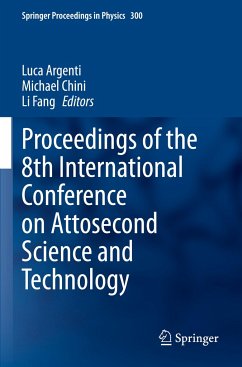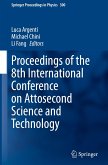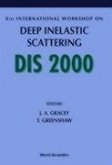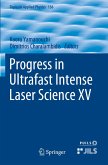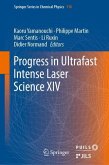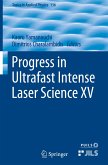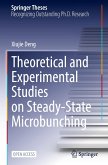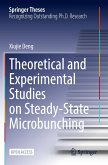Proceedings of the 8th International Conference on Attosecond Science and Technology
Herausgegeben:Argenti, Luca; Chini, Michael; Fang, Li
Proceedings of the 8th International Conference on Attosecond Science and Technology
Herausgegeben:Argenti, Luca; Chini, Michael; Fang, Li
- Broschiertes Buch
- Merkliste
- Auf die Merkliste
- Bewerten Bewerten
- Teilen
- Produkt teilen
- Produkterinnerung
- Produkterinnerung
This open access volume brings together selected papers from the 8th International Conference on Attosecond Science and Technology. The contributions within represent the latest advances in attosecond science, covering recent progress in ultrafast electron dynamics in atoms, molecules, clusters, surfaces, solids, nanostructures and plasmas, as well as the generation of sub-femtosecond XUV and X-ray pulses, either through table-top laser setups or with X-ray free-electron lasers. In addition to highlighting key advances and outlining the state of the field, the conference and its proceedings…mehr
Andere Kunden interessierten sich auch für
![Proceedings of the 8th International Conference on Attosecond Science and Technology Proceedings of the 8th International Conference on Attosecond Science and Technology]() Proceedings of the 8th International Conference on Attosecond Science and Technology37,99 €
Proceedings of the 8th International Conference on Attosecond Science and Technology37,99 €![Deep Inelastic Scattering - Proceedings of the 8th International Workshop Deep Inelastic Scattering - Proceedings of the 8th International Workshop]() Deep Inelastic Scattering - Proceedings of the 8th International Workshop280,99 €
Deep Inelastic Scattering - Proceedings of the 8th International Workshop280,99 €![Progress in Ultrafast Intense Laser Science XV Progress in Ultrafast Intense Laser Science XV]() Progress in Ultrafast Intense Laser Science XV88,99 €
Progress in Ultrafast Intense Laser Science XV88,99 €![Progress in Ultrafast Intense Laser Science XIV Progress in Ultrafast Intense Laser Science XIV]() Progress in Ultrafast Intense Laser Science XIV74,99 €
Progress in Ultrafast Intense Laser Science XIV74,99 €![Progress in Ultrafast Intense Laser Science XV Progress in Ultrafast Intense Laser Science XV]() Progress in Ultrafast Intense Laser Science XV88,99 €
Progress in Ultrafast Intense Laser Science XV88,99 €![Theoretical and Experimental Studies on Steady-State Microbunching Theoretical and Experimental Studies on Steady-State Microbunching]() Xiujie DengTheoretical and Experimental Studies on Steady-State Microbunching37,99 €
Xiujie DengTheoretical and Experimental Studies on Steady-State Microbunching37,99 €![Theoretical and Experimental Studies on Steady-State Microbunching Theoretical and Experimental Studies on Steady-State Microbunching]() Xiujie DengTheoretical and Experimental Studies on Steady-State Microbunching30,99 €
Xiujie DengTheoretical and Experimental Studies on Steady-State Microbunching30,99 €-
-
-
This open access volume brings together selected papers from the 8th International Conference on Attosecond Science and Technology. The contributions within represent the latest advances in attosecond science, covering recent progress in ultrafast electron dynamics in atoms, molecules, clusters, surfaces, solids, nanostructures and plasmas, as well as the generation of sub-femtosecond XUV and X-ray pulses, either through table-top laser setups or with X-ray free-electron lasers. In addition to highlighting key advances and outlining the state of the field, the conference and its proceedings serve to introduce junior researchers to the community, promote collaborations, and represent the global and topical diversity of the field.
Produktdetails
- Produktdetails
- Springer Proceedings in Physics 300
- Verlag: Springer / Springer International Publishing / Springer, Berlin / University of Central Florida
- Artikelnr. des Verlages: 978-3-031-47940-3
- 1st ed. 2024
- Seitenzahl: 240
- Erscheinungstermin: 1. März 2024
- Englisch
- Abmessung: 235mm x 155mm x 14mm
- Gewicht: 371g
- ISBN-13: 9783031479403
- ISBN-10: 3031479408
- Artikelnr.: 69096742
- Springer Proceedings in Physics 300
- Verlag: Springer / Springer International Publishing / Springer, Berlin / University of Central Florida
- Artikelnr. des Verlages: 978-3-031-47940-3
- 1st ed. 2024
- Seitenzahl: 240
- Erscheinungstermin: 1. März 2024
- Englisch
- Abmessung: 235mm x 155mm x 14mm
- Gewicht: 371g
- ISBN-13: 9783031479403
- ISBN-10: 3031479408
- Artikelnr.: 69096742
Luca Argenti received his degree in chemistry in 2001 from the University of Pisa, and his Ph.D. in chemistry in 2008, from the Scuola Normale Superiore of Pisa. From 2009 to 2010 he was postdoctoral fellow in the group of Eva Lindroth, at the University of Stockholm, working on theoretical attosecond spectroscopy of atoms. In Summer 2010 he joined the group of Fernando Martín at the Autonomous University of Madrid. Since 2016, he has been with the University of Central Florida where he leads the theoretical Attosecond Group at the Department of Physics and CREOL, and where he is now Associate Professor. His research focuses on the time-resolved study of the correlated motion of electrons in polyelectronic atoms and molecules. He is the recipient, in 2020, of the DOE CAREER award. From 2020 to 2022, he co-chaired the Theoretical Atomic, Molecular, and Optical physics Community (TAMOC). Michael Chini is an Associate Professor of Physics, with a secondary joint appointment in CREOL, the College of Optics and Photonics, at the University of Central Florida (UCF). He received his BSc in Physics from McGill University in 2007 and then conducted graduate research in attosecond science at both Kansas State University (2007-2011) and UCF (2011-2012), earning a PhD in Physics from UCF in 2012. He remained at UCF as a postdoctoral scholar in the group of Zenghu Chang and then as a Senior Research Scientist in the group of Martin Richardson, after which he joined the faculty in Fall 2015. His research focuses on high-order harmonic generation and attosecond source development, attosecond spectroscopy in gases and solids, and lightwave electronics. He is a recipient of the ORAU Ralph E. Powe Junior Faculty Enhancement Award, a Young Investigator Program award from AFOSR, and a DOE Early Career Research Award. In Fall 2024, he will join the faculty in the Department of Physics at the Ohio State University. Li Fang is an Assistant Professor of Physics, with a secondary joint appointment in CREOL, the College of Optics and Photonics, at the University of Central Florida (UCF). She received her PhD in Physics from University of Connecticut in 2009 and conducted her postdoctoral research at LCLS, SLAC Accelerator National Laboratory (2009-2014). After her postdoctoral work, she joined the Center for High Energy Density Science as a research associate at University of Texas at Austin (2014-2018) and the Physics Department at the Ohio State University as a scientist (2018-2019). She joined the faculty of physics at UCF in 2020. Her research concerns ultrafast and attosecond spectroscopy of charge dynamics in atomic, molecular, and extended systems. She is a recipient of a DOE Early Career Research Award in 2020.
Chapter 1. Single-cycle infrared waveform generation and control.- Chapter 2. Increase in Photon Flux of Attosecond Pulses.- Chapter 3. Bright coherent XUV generation in microfluidic glass devices for ultrafast x-ray spectroscopy.- Chapter 4. Attosecond Physics and Quantum Information Science.- Chapter 5. Dynamics via Attosecond Four-Wave Mixing.- Chapter 6. Optical control of autoionizing states in argon.- Chapter 7. Retrieving a Complex Molecular Structure from Laser-Induced Electron Diffraction using Ma-chine Learning.- Chapter 8. Imaging ultrafast Dissociation Dynamics: OCS & Roaming in Formaldehyde.- Chapter 9. Controlling the time evolution of electron-nuclei entanglement for steering vibronic coherences dynamics induced by short 1-2 fs optical pulses.- Chapter 10. An MQDT model for the description of time resolved pump probe experiments.- Chapter 11. ASTRA, A Transition Density Matrix Approach to the Interaction of Attosecond Radiation with Atoms and Molecules.- Chapter 12. Symmetry-protected chiral sensitivity in photoionization with bichromatic fields.- Chapter 13. Experimental investigation of topological property of degenereate singularities in rescattering processes.- Chapter 14. Simulating strong field tunnel ionization of molecules.- Chapter 15. Control of photoelectron-ion entanglement in attosecond laser-induced photoionization of H2.- Chapter 16. Ultrafast Second-harmonic XUV Spectroscopy: A Novel Probe for Symmetry.- Chapter 17. From Ultrafast Light-Induced Currents to Spatially-Resolved Field Sampling.- Chapter 18. Attosecond core-exciton dynamics in wide-gap insulators.- Chapter 19. Polarization-Shaped Strong Field Control over Valley Polarization with Mid-IR Light.- Chapter 20. The Future of Attosecond Science.
Chapter 1. Single-cycle infrared waveform generation and control.- Chapter 2. Increase in Photon Flux of Attosecond Pulses.- Chapter 3. Bright coherent XUV generation in microfluidic glass devices for ultrafast x-ray spectroscopy.- Chapter 4. Attosecond Physics and Quantum Information Science.- Chapter 5. Dynamics via Attosecond Four-Wave Mixing.- Chapter 6. Optical control of autoionizing states in argon.- Chapter 7. Retrieving a Complex Molecular Structure from Laser-Induced Electron Diffraction using Ma-chine Learning.- Chapter 8. Imaging ultrafast Dissociation Dynamics: OCS & Roaming in Formaldehyde.- Chapter 9. Controlling the time evolution of electron-nuclei entanglement for steering vibronic coherences dynamics induced by short 1-2 fs optical pulses.- Chapter 10. An MQDT model for the description of time resolved pump probe experiments.- Chapter 11. ASTRA, A Transition Density Matrix Approach to the Interaction of Attosecond Radiation with Atoms and Molecules.- Chapter 12. Symmetry-protected chiral sensitivity in photoionization with bichromatic fields.- Chapter 13. Experimental investigation of topological property of degenereate singularities in rescattering processes.- Chapter 14. Simulating strong field tunnel ionization of molecules.- Chapter 15. Control of photoelectron-ion entanglement in attosecond laser-induced photoionization of H2.- Chapter 16. Ultrafast Second-harmonic XUV Spectroscopy: A Novel Probe for Symmetry.- Chapter 17. From Ultrafast Light-Induced Currents to Spatially-Resolved Field Sampling.- Chapter 18. Attosecond core-exciton dynamics in wide-gap insulators.- Chapter 19. Polarization-Shaped Strong Field Control over Valley Polarization with Mid-IR Light.- Chapter 20. The Future of Attosecond Science.

